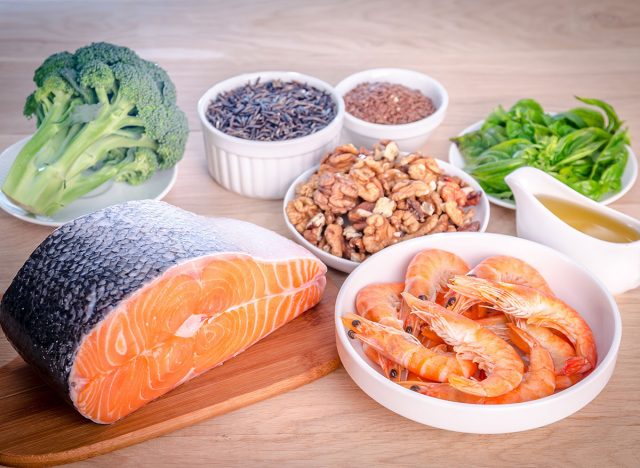7 Worst Eating Habits Causing Inflammation & Aging You Faster

You’ve no doubt come across this nutrition buzzword, “inflammation.” And like a lot of folks, you may not fully understand what it means or why it’s such a hot topic. So, before getting into the worst eating habits for inflammation and aging, let’s get solid on what inflammation really is.
Whether you’re stung by a bee or burn your hand on the stove, your body has an immune response that fends off toxins, pathogens, and infections, causing short-term inflammation in the process. The dark side of inflammation is when it becomes chronic and simmers in the background, with the swelling and heat never abating because your body keeps sending out inflammatory cells to fight even when there’s no invader.
This type of long-term, low-grade inflammation can damage tissues and joints. “You may even notice that your skin ages faster when you’re constantly inflamed as inflammation can break down collagen and elastin, which are responsible for keeping your skin looking young and supple,” says Dr. Rene Armenta, a surgeon with Renew Bariatrics.
Months and years of chronic inflammation may also initiate such inflammatory diseases as cardiovascular disease, cancer, type 2 diabetes, kidney disease, autoimmune disorders, and non-alcoholic fatty liver disease, according to research published in Nature Medicine. These inflammatory diseases and disorders are associated with aging.
Eating foods with anti-inflammation properties is part of a two-prong approach to avoiding aging-associated diseases. The other is ditching the following worst types of eating habits that may trigger inflammation and accelerate aging. Read on to learn more about eating habits that can cause inflammation and age you faster, then make sure to check out 10 Easy Tricks for Eating Healthy Every Day.
You’re not getting enough omega-3s.

You’ve likely heard of omega-3s, especially in conversations around heart health, cognition, and aging. These are polyunsaturated fatty acids that are commonly found in certain foods, such as seafood and plants. There are three types of omega-3s: DHA, which is found in fish; EPA, which is also found in fish; and ALA, which is found in some plant-based foods like walnuts, chia seeds, and flaxseed. Outside of the food we consume, you can also take omega-3 supplements. The reason these fatty acids are talked about so often in relation to our health is because research has found them to have anti-inflammatory qualities, which can help ensure healthy aging.
According to a report published in Frontiers in Psychiatry, omega-3s have the ability to help reduce inflammation related to neurological, neurodegenerative, and psychiatric disorders, such as depression, Alzheimer’s disease, and dementia. A 2019 study from Circulation Research found that omega-3 supplements may be able to decrease inflammation by increasing the amount of anti-inflammatory molecules in the body.
One 2020 study published in Atherosclerosis concluded that even though both DHA and EPA (the two type of marine omega-3s) have anti-inflammatory properties, DHA may have a potentially larger impact. In fact, researchers found that DHA reduced four types of inflammatory proteins in the body and EPA fatty acids reduced one. However, both types still have an effect.
By not consuming enough of these polyunsaturated fatty acids on a consistent basis, you are missing out on an opportunity to fight inflammation as you age.
You’re not eating enough fresh fruits and vegetables.

Not getting enough fruits and vegetables is one of the worst eating habits for inflammation. “Fruits like berries and oranges and green leafy vegetables like spinach and kale provide the vitamins, minerals, and antioxidants we need to help keep our immune systems healthy and strong, which is essential especially as you age,” says medical review board member Amy Goodson, MS, RD, a registered dietitian and the author of The Sports Nutrition Playbook. “Only one in 10 people eat the recommended amounts, which means 90% of us can do a better job.”
You’re eating ‘AGE’ foods like french fries.

The high temperatures needed to fry foods can create harmful compounds called Advanced Glycation End Products (AGEs) that accumulate in the body as we age.
“Foods such as cooked red meat and refined carbohydrates like white bread contain AGEs,” says Johna Burdeos, RD, owner of Dietitian Johna. “Consuming too much of these foods can result in cellular damage and inflammation, which can speed up the aging process and increase the risk of insulin resistance and type 2 diabetes. The inflammatory response in the skin is seen in visible signs of weakened skin elasticity, like wrinkles, puffiness, and acne.”
You’re eating processed junk foods.

Processed meats like cold cuts, bacon, hot dogs, and junk foods like candy bars, cookies, sugary drinks, potato chips, ice cream, and fast foods are not the healthiest things to eat, and loading up on these can be one of the worst eating habits for inflammation and aging. Research suggests these ultra-processed foods, the hallmark of what’s known as the Western Diet, can disrupt the delicate balance of healthy and unhealthy microbes in the gut or microbiome.
“When processed foods alter the bacteria that live in our gut, this triggers an altered immune response leading to chronic inflammation,” says Kathryn Piper, RDN, LD, of The Age-Defying Dietitian. “Diabetes, heart disease, and dementia have been linked to chronic inflammation.”
You’re not eating enough fiber.

The remedy for an unhealthy microbiome is avoiding ultra-processed foods and making a habit of getting more dietary fiber, ideally 25 to 38 grams per day from foods like whole grains, fruits, vegetables, nuts, seeds, beans, lentils, and legumes, suggests Goodson.
“Very few people eat enough fiber, but if you want to age gracefully with positive gut health and a healthy cholesterol, fiber is the key,” says Goodson. “Make your goal to get 4 to 6 grams of fiber at every meal and snack throughout the day.”
You’re hitting up too many happy hours & frequently drink alcohol.

Drinking any alcohol may increase inflammation in your body, and excessive alcohol intake definitely increases your risk of chronic low-grade inflammation among other health hazards, says Piper. In fact, one study published in Alcohol Research found that chronic alcohol consumption was associated with intestinal inflammation, as well as negative altering of the gut microbiome.
“If you drink, limit your consumption to the recommended less than 1 alcoholic beverage per day for women and less than 2 drinks per day for men,” adds Piper.
You’re eating a lot of foods that contain gluten.

Gluten is a protein found in wheat and other grains, which means it shows up in bread, pizza crust, pasta, baked goods, and cereals. Although many people digest gluten without issue, people who are sensitive to gluten (a condition called nonceliac gluten sensitivity) experience a different type of immune response that causes an inflammatory effect, according to a 2020 study in Gastroenterology.
“If someone experiences gut issues, has been diagnosed with an autoimmune disease, or has had unexplained chronic symptoms that put them on the path to an autoimmune disease or another serious diagnosis, then going gluten-free will likely help,” says Jenny Levine Finke, a certified integrative nutrition coach and author of Dear Gluten, It’s Not Me, It’s You.
In a 2022 study published in Nutrition Reviews, researchers found that a gluten-free diet can “ameliorate” autoimmune-related symptoms in 64.7% of those with a non-celiac autoimmune disease. For clues to where you stand with gluten, ask your doctor or dietitian to know what’s good for you as an individual.
A previous version of this story was published on August 21, 2022. It has been updated to include additional copy and proofreading revisions, additional research, and updated contextual links.









